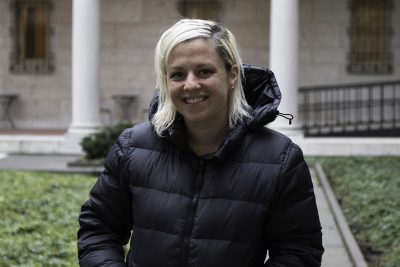
In 2017, looking for someone special is not a simple task. Countless of apps and websites populate the internet, often leaving individuals with a difficult question: to swipe right, or not to swipe right.
With the abundance of opportunities to find a date, however, there are also many risks, from slight exaggerations to completely fake profiles. One new Boston-based startup, a professional online private investigation website called Aste, is looking to overcome the dangers of internet dating. It’s not a traditional dating app, but a tool to expose the dangers of online dating.
For founder Julie Nashawaty, the perils of an unsavory match on a dating app are more than a cautionary tale. On Aste’s website, she tells the story of how she nearly dated a bank robber who failed to disclose his criminal history on his profile.
After developing Aste and sharing stories, she discovered that she wasn’t alone in such a shocking experience.
“I had a lot of people come forward and just say [they had unknowingly dated] an ex-con,” she said, adding that “everyone has a terrible story, everyone knows someone with a terrible story.”
To combat the persistent issues of false information, often known as “catfishing” in the online dating sphere, Nashawaty, who comes from an artificial intelligence development background, formulated a human-powered system with quality control.
For each individual submitted to Aste’s system, Nashawaty explained that two employees will independently search the individual’s social media profiles, criminal history, marital history and other additional details based solely on the first name, phone number and general location.
Nashawaty emphasized that unlike other search engines, which depend on computer coding to vet people, Aste relies on “all human-powered labor.” She calls the unique system a “human algorithm” and said that each investigator is trained to produce the same results.
Despite being primarily human-operated, each report is purely informational and does not offer insights on compatibility. Aste doesn’t make any decisions about whether a searched individual is a “good” or “bad” person.
“This isn’t biased in any way,” Nashawaty said, adding that every individual is researched using the same process.
While the lack of opinions supplied by the Aste team removes any sphere of romantic influence from clouding results, it also limits expansion of the business. In order to maintain this business, it’s unlikely to see an Aste-linked dating app in the near future.
Although Aste may never enter the market of dating apps, certain applications are taking their own measures to ensure dating safety and eliminate the risk of malicious intent or unsavory personal histories.
DragonFruit, a dating app that claims to be “for geeks by geeks,” is cognizant of the risks of online dating and false information in profiles, but it does not yet have a standardized process for dealing with complaints.
“During account-creating, [there] are parameters that filter out bot accounts,” wrote David Puccio, digital marketing manager of DragonFruit, in an email. “Like Aste, complaints are “dealt with by an individual” rather than a computer-based algorithm.
Meanwhile, Siren, a Seattle-based app centered around more dynamic dating profiles, is focused on challenging not just case-by-case issues but also the culture of dating apps as a whole.
By relying on a daily question to prompt connections, Siren CEO Susie Lee said she believes that eliminating static profiles and stagnant information reduce the risk of discovering that a perceived soulmate is not who they say they are.
“One of our missions is to create a sense of authenticity and safety to the best of our abilities,” Lee said.
She added that some dating apps create fake profiles to lure in new users. She was advised to use this tactic, but chose not to partly because it would “foster a culture in which fake profiles are OK.”
With no reports of harassing messages so far, and device-linked profiles to prevent repeat offenders, Lee emphasized that the app aims to provide a “safe haven” to those wary of the risks of online dating.
“We are not [going to] back down,” Lee said.
Unlike the algorithmic maintenance that dating apps must manage, Aste faces a hurdle that digitally-run businesses don’t face: the high cost of maintaining full-time, well-trained employees.
Each investigation costs $29.95, discounted only when purchased in bundles of multiple reports. For a meetup that may involve only a cheap coffee, the investigation price can seem steep, especially on a limited budget.
Nashawaty has wrestled with the issues of cost since the inception of the business. She said the cost of a report is unlikely to be lower because of labor logistics.
The importance of a “quick gut check,” she said, outweighs the financial cost of the report.
“We like to spend money on feeling protected,” she said. “Can you put a price on your own personal safety?”
















































































































